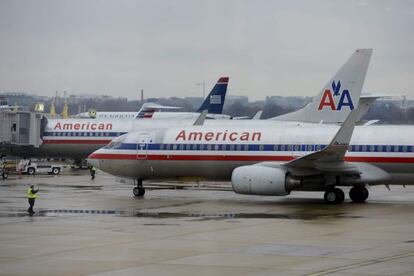Currency controls force airlines to ground passengers in Venezuela
Carriers demand that people pay for their tickets in dollars rather than bolivars

Various international airlines are no longer accepting fare payments in Venezuelan currency, a move that has suddenly grounded many passengers in the country and is believed to have stranded hundreds abroad, analysts confirmed on Wednesday.
The recent move, which has sparked complaints from passengers, comes after the Venezuelan government made it difficult for foreign companies to trade their bolivars for dollars under tightly controlled currency rules. Among those said to have stopped selling seats in bolivars are American Airlines, Aeroméxico and Avianca.
Because of rigid bureaucracy and the shortage of hard cash in Venezuela, the money owed to airline companies has ballooned to $2.6 billion since September, said the International Air Transport Association.
Up until now, payments for airline tickets were accepted in bolivars on the pledge that the Nicolás Maduro government would buy back the local currency in dollars at the official 6.3 bolivars-to-the-dollar exchange rate. But in September the government, which is undergoing serious cash-flow problems, stopped the reimbursements.
The carriers countered by blocking off large sections of seating on their planes on routes to and from Caracas so as not to increase their exposure and selling the remainder of the seats at exorbitant rates. This practice, according to analysts, has left finding a ticket to and from the country difficult. A round-trip ticket to Miami could cost anywhere up to $3,500 while the same fare to Bogota goes for around $2,700.
International financial analysts have predicted that Maduro government will soon devalue the bolivar for the eighth time in 11 years, which will leave the airlines even more exposed to losses.
Quoting unnamed sources, the Caracas daily El Nacional reported that some carriers are studying whether to cease operations in Venezuela altogether. The entire situation is close to becoming a virtual prohibition on people leaving the country, and it comes during the busy holiday season.
Reports surfaced last week that the Maduro government offered to pay the government’s debt to the carriers with fuel, but they rejected the deal.
The air crisis was heightened when Air France’s pilots union on Wednesday asked their members not to fly into Caracas until conditions at Simón Bolívar International Airport in Maiquetía are improved. On Saturday, Venezuelan authorities were put on alert after a false bomb threat was made as Air France flight 385 from Paris was about to land at Simón Bolívar.
In September, French authorities were astounded when they found 30 unclaimed suitcases filled with cocaine on an Air France flight from Caracas – it was the biggest drug haul in recent years by French police.
Tu suscripción se está usando en otro dispositivo
¿Quieres añadir otro usuario a tu suscripción?
Si continúas leyendo en este dispositivo, no se podrá leer en el otro.
FlechaTu suscripción se está usando en otro dispositivo y solo puedes acceder a EL PAÍS desde un dispositivo a la vez.
Si quieres compartir tu cuenta, cambia tu suscripción a la modalidad Premium, así podrás añadir otro usuario. Cada uno accederá con su propia cuenta de email, lo que os permitirá personalizar vuestra experiencia en EL PAÍS.
En el caso de no saber quién está usando tu cuenta, te recomendamos cambiar tu contraseña aquí.
Si decides continuar compartiendo tu cuenta, este mensaje se mostrará en tu dispositivo y en el de la otra persona que está usando tu cuenta de forma indefinida, afectando a tu experiencia de lectura. Puedes consultar aquí los términos y condiciones de la suscripción digital.








































